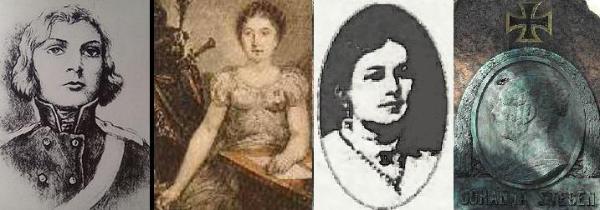

Anna Lühring (1796-1866) was inspired by the death of Eleonore Prochaska. The daughter of a craftsman in Bremen, she also disguised herself as a man and in February 1814 joined the Lützow Free Corps under the name Eduard Kruse. She participated in the siege of Jülich and other battles. Although her true identity was discovered, she remained in the unit until its return to Berlin and was honored for her services. She later married Karl Lucks and died alone and poor in 1866.
(Sophie Dorothea) Friederike Krüger, alias August Lübeck or Auguste Krüger (1789-1848) also disguised herself as a man and became a soldier in the Prussian army. She served during the Napoleonic Wars from 1813 to 1815 in the first company of the Kolbergsches Infanterieregiment. Even after being discovered a woman, she remained in the army and was promoted to corporal after the Battle of Möckern. She married at war’s end had four children. She was awarded the Iron Cross by Firedrich Wilhelm III of Prussia for her bravery. On her death, she was buried in the St.-Georgen-Friedhof in Templin, where her grave can still be seen.
Johanna Stegen (1793-1842) did not disguise herself but was considered also a heroine during the Napoleonic Wars. On April 2, 1813, German troops fought Napoleonic troops near Lüneburg where in the course of the battle, the Prussian regiment risked running out of ammunition and Johanna rushed ammunition to them in her apron, contributing significantly to the Prussian victory. She was glorified soon afterwards in the patriotic poems of Friedrich Rückert. In 1817, she married a Prussian corporal. In her memory a war monument was erected in Lüneburg, and once a year a young woman dresses up as Johanna and tells her story.
Top: Eleonore, Anna, Friederike and Johanna